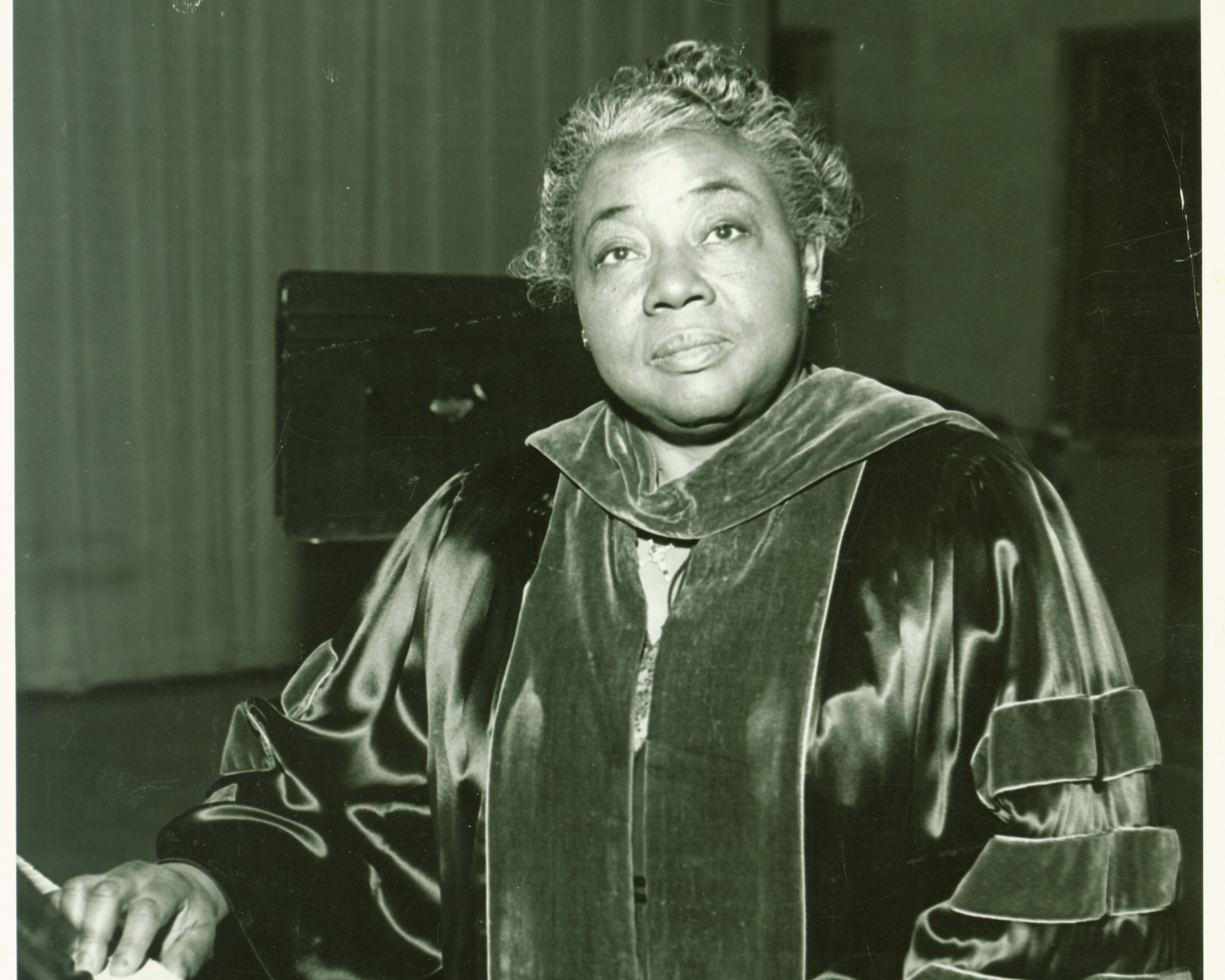Born in Coffeyville, Kansas, on January 20, 1895, Eva Alberta Jessye started her academic career in the public schools of Coffeyville and Iola, Kansas. At age 13 she attended Western University in Quindaro, Kansas. She graduated from Western University in 1914 and went on to Langston University in Oklahoma where she received a lifetime certificate in teaching.
Jessye taught in elementary schools in Taft, Haskell, and Muskogee, Oklahoma before she became a reporter and columnist for the Baltimore (Maryland) Afro-American in 1925. In 1926 she joined a choral group in New York called the Dixie Jubilee Singers. This group would eventually become the world-renowned Eva Jessye Choir. The choir performed spirituals, work songs, ballads, ragtime, jazz, and light opera in a variety of mediums, such as radio, film, and stage. They were regulars on the "Major Bowes Family Radio Hour" and the "General Motors Hour." In 1927 the Dixie Jubilee Singers worked in Harry A. Pollard's film, Uncle Tom's Cabin. The same year, Dr. Jessye compiled and published a critically acclaimed collection of songs titled My Spirituals. In 1929 King Vidor directed "Hallelujah", the first musical motion picture with an all-Black cast. The film featured the Dixie Jubilee Singers with Jessye as choral director.
Dr. Jessye was appointed choral director for the New York production of the Virgil Thomson and Gertrude Stein opera, "Four Saints in Three Acts" in 1934. In 1935 Jessye was selected by George Gershwin to be choral director for the original production of his 1935 folk-opera, "Porgy and Bess." For the next three decades, Jessye was associated with almost every Porgy & Bess production worldwide, earning the unofficial title of 'curator and guardian of the score.'
Eva Jessye was also involved in humanitarian efforts. Her experiences as a black woman during the Jim Crow era influenced her involvement in the later Civil Rights movement. She collaborated with African-American notables Marian Anderson, Mary McLeod Bethune, Julia Davis, Eubie Blake, Langston Hughes, Martin Luther King, Jr., and Paul Robeson. In August 1963, Martin Luther King, Jr. selected the Eva Jessye Choir as the official chorus of the historic March on Washington. The choir performed "We Shall Overcome" and "Freedom Is The Thing We're Talking About." Tom Mboya, founder of Kenya's Independence Movement Council and president of the People's Convention Party, later used the recordings of these songs during Kenya's struggle for independence. During the 1960s Eva Jessye also appeared in the motion pictures Black Like Me and Slaves.
Dr. Jessye returned to academia in her later years. She established the Eva Jessye Afro-American Music Collection at the University of Michigan in Ann Arbor in 1974. She established the Eva Jessye Collection at Pittsburg State University in Pittsburg, Kansas in 1977 and served as that University's Artist-In-Residence from 1978 to 1981.
During her lifetime Jessye received honorary degrees from Wilberforce University, Allen University, and Southern University, including an honorary doctorate. She also received numerous citations from government, educational, and musical organizations. In 1981, Governor John Carlin of Kansas declared Dr. Eva Jessye to be Kansas Ambassador for the Arts.
In a 1984 interview by Jacob U. Gordon, Jessye was asked what she considered some of the drawbacks of being black and elderly in Kansas? Her reply was, "I often think if I had been white, where would I have been? Perhaps not anywhere. Because I think I had it made, you know. Who's that who said he took the path less traveled by? Robert Frost? I took the color less desirable and it made all the difference."
Dr. Eva Jessye died on February 21, 1992 at the age of 97 in Ann Arbor, Michigan.
Finding Aid: Eva Jessye Collection, 1885-1994 (MS009)
Browse the Eva Jessye Collection, 1885-1994 Collections:
Eva Jessye Certificates and Awards



